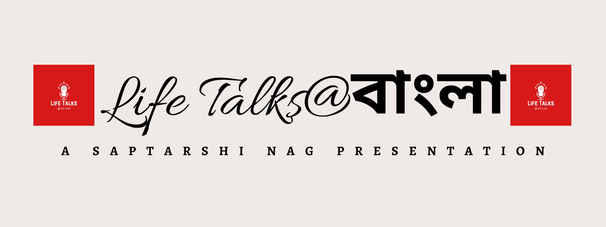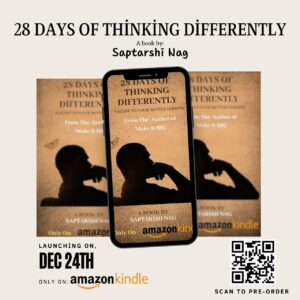
Rank- 3rd
Author: TAMAL GHOSH AGE-27
ADDRESS-MADHUSUDANPUR, SINGUR
QUALIFICATION-B.TECH(POWER ENGINEERING)

Humanbird, a species intermingled in complexities, ethical perplexities, paradoxical notions, flies through the clouds of struggles on the wings of experience. He confronts the stormy wind of confounding principles, he becomes bewildered in the rain of skepticism, he gets allured by the lust of materialistic bliss but he continues his journey. He gathers new emotions, qualities, learning about life & keeps discovering new terrain of life. These new traits on the course of his journey inculcate new qualities or the virtues which in turn make him aware and prudent about the uncertainty of his future destination. He uses these ingrained qualities to make decisions to remain firm at the brutal battle of survival for the fittest. Thus he discerns the subtlety of life. He feels emotions of own or others. Sometimes he acts with his emotions or sometimes against it. Thus he realizes the variability of life, the fallibility of dogmas, articulation of objectives, and nuances of different aspects of society. He becomes knowledgeable. On the course of his journey, he becomes impoverished in poverty or dazzled with wealth. He becomes skilled, mature. He unriddles mysteries, discovers things. Amidst interaction among all these elements, he gains qualities in both negative & positive which further enrich his sagacity.
Qualities can be vice or virtue which in-turn is a variable objective from the societal point of view. So accordingly, the gathered knowledge changes its color with respect to one’s co-ordinates of perception and acceptation towards others. A terrorist tempts to do mayhem which is virtuous from his point of view but it becomes pernicious from the societal point of view so society learns about fringe ideas which are detrimental to their existence and this gathered experience strives them to take precautionary measures such as de-radicalization drive, keeping a check on fringe elements, etc. On the other hand, the terrorist finds his objective as a noble cause for the survival of his ideological wars and gathers knowledge about the so-called heretic norms of society. This knowledge or notion of the terrorist can be termed as pre-occupied, unsustainable notions from the point of view of the larger section of the society. So virtue, vices, knowledge themselves are not eternally fixed cardinal doctrines of human’s complicated self rather those vary with respect to one’s own position.
Experience, one’s way of thinking and pretending things have bearing on this addled relationship of virtue-knowledge. How one will use his virtue whether he will use it as vice or embodiment of oneself or not, depends upon himself, his inner cognitions & self-apprehensions from his experience. Though their evaluation depends on how one will see them from one’s own gathered knowledge.
Ashoka, the mighty Mauryan, after ravaging Kalinga thoroughly gathered the virtue of empathy towards mankind became genuflected at the altar of “Dhammavijaya”. So the experience of the carnage of war brought the virtue of humanly ethics in his character which in turned enlightened him with the knowledge of blood-brutality, sufferings of war. On the other hand victory through the brutality of Persian war tempted Alexander further to continue his smacked policy of blood, iron & conquest with the gathered ingrained sense of own’s invincibility. Ashoka would seem to be naive & Alexander seemed to be indefatigable will be true if the things are seen from the ethical perspective of piousness, righteousness, kindness. But if I want to judge their positions from the lens of a mighty conqueror my assumptions can be in peril. Though all this arguments-counter arguments we may take the greater good from the social aspect as reference frame to judge one’s principle & the effect on others as since the advent of human civilization it is deemed to be treated that humans aspire to be developed, make pace with progress & also work for the society once they become enlightened individuals on earth. Our pre-preoccupied gumption is that vices are evils. Though if in some other planets the vices are treated as acceptable social norms then my analysis of the above example could be fallacious.
Does passion has any bearing on the quality of our character? Aristotle, Plato have argued vociferously about the effect of former on the latter. Passion itself tempts one to continue one’s journey towards achieving new goals. Passions sometimes beguile one & throw the latter into oblivion devoid of one’s ethical doctrine. He may become deceived by lustrous mirage of quick gains which may be antithetical to the societal accepted norms. Such endeavors for goals may jeopardize his own existence, moral values or even the stability of society. So he accumulates vices from societal perception. The vices trigger negative knowledge about seeing ways and things about life thus degrading one’s own wisdom.
Wisdom, whether good or bad sometimes also emanates from ignorance. Medieval people used to believe that Sun rotated around the earth, They believed it due to lack of technological advance. So making mockery of them from the Modern century perspective may not do justice with their knowledge. Because virtue keeps changing with the advancement of human civilization, so does perceived knowledge. But if one wants to weigh them equally we must find either some common ground. For example it will be futile to argue whether Aurangzeb was a “secular” or ‘communal”, whether there was any sense of “Nationalism” during Guptas or not,At what extent Ashoka had shown universal “liberty” to every religion whether Amir Khusraw could be treated as “Historian” or not as the virtuous ideas such as secularism, communalism, nationalism, fraternity, liberty themselves are the concepts of 19th century. But we may judge Aurugugzeb on the light of virtue of “Orthodoxical” tenets, Ashoka on the light of “Tolerance”, Guptas in term of “feudatories”, Amir Khusraw in terms of “Incident tellers” or “Protege” since these terms have remained common in the ancient, medieval and modern period. Another thing is that our percept knowledge also changes with respect to the use of different virtuous terms which create a problem as well. Communalism & Orthodox are two different terms with subtle and unique meanings. Communalism refers to strong attachment towards one’s own community while a person even can be orthodox after remaining a true “secular” For example-A person can be tolerant to every religion but still does not believe in preaching education for women.
Thus virtues help to inculcate knowledge which keeps changing but what matters the most is grasping of true knowledge. A sinful person can become true knowledgeable. Balmiki was a notorious dacoit who composed the epic Ramayana after renunciation of violence. As per earthly principle, one may or may not be deceived by vices but he must possess the inner urge to cleanse his chasm of heart from the dust of sins.
One needs true ethical, moral based education to make a distinction between true knowledge & wrong ideas. A true, ethical, virtuous abiding principle from the benevolent views of greater societal acceptance can obliterate the shadow of darkness from one’s own character and embody one’s true enlightened spirit of wisdom, which aspires to achieve the value-based goal from which entire society can be benefitted.
In the world of violence and moral degradation when erosion of values & corrosion of social fabric are being repeated, what type of virtuous path needs to be followed in this fretful hours? Social creatures especially the humans need to be inculcated with morality, drenched in piousness and swept with righteousness. The role of an ideal civic society is becoming critical today. The preaching of peace, tolerance, rationalism, logic may help to evoke consciousness of the human soul which will ultimately guide him to be a true knowledgable person. Virtue is essential for the path of emancipation of true erudition but getting swayed away by vices can impawn the true fragrance of knowledge.









